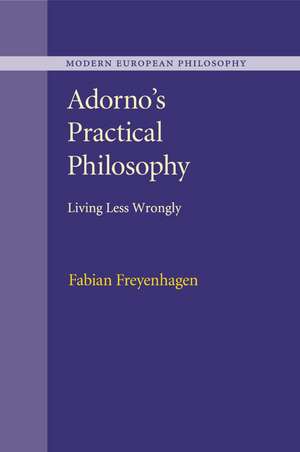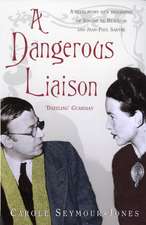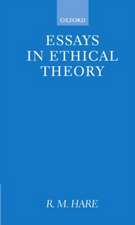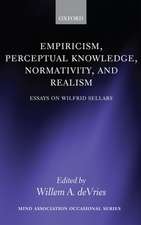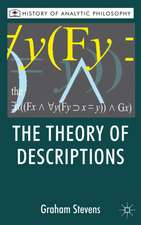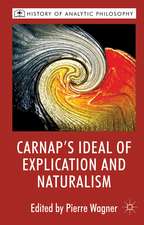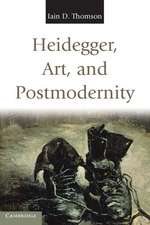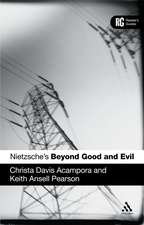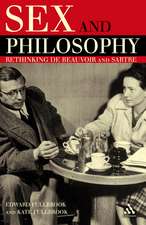Adorno's Practical Philosophy: Living Less Wrongly: Modern European Philosophy
Autor Fabian Freyenhagenen Limba Engleză Paperback – 29 iul 2015
| Toate formatele și edițiile | Preț | Express |
|---|---|---|
| Paperback (1) | 236.61 lei 6-8 săpt. | |
| Cambridge University Press – 29 iul 2015 | 236.61 lei 6-8 săpt. | |
| Hardback (1) | 695.93 lei 6-8 săpt. | |
| Cambridge University Press – 24 iul 2013 | 695.93 lei 6-8 săpt. |
Din seria Modern European Philosophy
-
 Preț: 102.23 lei
Preț: 102.23 lei -
 Preț: 193.16 lei
Preț: 193.16 lei -
 Preț: 192.64 lei
Preț: 192.64 lei -
 Preț: 195.52 lei
Preț: 195.52 lei -
 Preț: 296.69 lei
Preț: 296.69 lei -
 Preț: 233.56 lei
Preț: 233.56 lei -
 Preț: 273.11 lei
Preț: 273.11 lei -
 Preț: 279.86 lei
Preț: 279.86 lei -
 Preț: 370.56 lei
Preț: 370.56 lei -
 Preț: 333.43 lei
Preț: 333.43 lei -
 Preț: 441.96 lei
Preț: 441.96 lei -
 Preț: 289.40 lei
Preț: 289.40 lei -
 Preț: 312.27 lei
Preț: 312.27 lei -
 Preț: 409.33 lei
Preț: 409.33 lei - 14%
 Preț: 764.18 lei
Preț: 764.18 lei -
 Preț: 275.63 lei
Preț: 275.63 lei -
 Preț: 214.21 lei
Preț: 214.21 lei - 11%
 Preț: 548.33 lei
Preț: 548.33 lei -
 Preț: 327.20 lei
Preț: 327.20 lei -
 Preț: 406.83 lei
Preț: 406.83 lei -
 Preț: 423.35 lei
Preț: 423.35 lei - 14%
 Preț: 873.19 lei
Preț: 873.19 lei -
 Preț: 286.63 lei
Preț: 286.63 lei -
 Preț: 362.87 lei
Preț: 362.87 lei - 11%
 Preț: 487.63 lei
Preț: 487.63 lei -
 Preț: 344.99 lei
Preț: 344.99 lei - 11%
 Preț: 552.94 lei
Preț: 552.94 lei - 11%
 Preț: 643.05 lei
Preț: 643.05 lei -
 Preț: 458.83 lei
Preț: 458.83 lei -
 Preț: 445.71 lei
Preț: 445.71 lei -
 Preț: 310.75 lei
Preț: 310.75 lei -
 Preț: 445.34 lei
Preț: 445.34 lei - 11%
 Preț: 459.31 lei
Preț: 459.31 lei - 11%
 Preț: 647.01 lei
Preț: 647.01 lei -
 Preț: 365.22 lei
Preț: 365.22 lei -
 Preț: 243.55 lei
Preț: 243.55 lei - 11%
 Preț: 552.94 lei
Preț: 552.94 lei -
 Preț: 429.91 lei
Preț: 429.91 lei -
 Preț: 404.09 lei
Preț: 404.09 lei
Preț: 236.61 lei
Nou
Puncte Express: 355
Preț estimativ în valută:
45.28€ • 49.33$ • 38.15£
45.28€ • 49.33$ • 38.15£
Carte tipărită la comandă
Livrare economică 23 aprilie-07 mai
Preluare comenzi: 021 569.72.76
Specificații
ISBN-13: 9781107543027
ISBN-10: 1107543029
Pagini: 302
Ilustrații: black & white illustrations
Dimensiuni: 153 x 230 x 20 mm
Greutate: 0.4 kg
Editura: Cambridge University Press
Colecția Cambridge University Press
Seria Modern European Philosophy
Locul publicării:New York, United States
ISBN-10: 1107543029
Pagini: 302
Ilustrații: black & white illustrations
Dimensiuni: 153 x 230 x 20 mm
Greutate: 0.4 kg
Editura: Cambridge University Press
Colecția Cambridge University Press
Seria Modern European Philosophy
Locul publicării:New York, United States
Cuprins
Introduction; 1. The whole is untrue; 2. No right living; 3. Social determination and negative freedom; 4. Adorno's critique of moral philosophy; 5. A new categorical imperative; 6. An ethics of resistance; 7. Justification, vindication, and explanation; 8. Negativism defended; 9. Adorno's negative Aristotelianism; Appendix: the jolt - Adorno on spontaneous willing.
Recenzii
'Freyenhagen has written a lucidly argued, patient, and relentless defense of Adorno's negative ethics that provides both an excellent addition to the secondary literature on Adorno, and, more importantly, a spirited intervention into current debates in contemporary moral philosophy. This work will be of interest to scholars and graduate students working in the area of moral philosophy, making available as never before the bold structures of Adorno's negative ethics, and with its clear and direct writing and argument, this work would be entirely suitable for advanced undergraduates.' J. M. Bernstein, The New School for Social Research
'Fabian Freyenhagen has written an exceptionally clear, insightful, and comprehensive treatment of Adorno's intense dissatisfactions with modern societies. This is likely the best philosophical reconstruction of Adorno's actual, often unstated and unclear 'moral theory' that we will ever get, and that certainly makes this an important book. Both defenders of Adorno and his critics will now have a much better picture of Adorno's basic normative commitments and why he felt entitled to them.' Robert Pippin, University of Chicago
'Freyenhagen's diligence is extraordinary. Just about every proposition in Adorno's writings with normative import is painstakingly considered.' The Times Literary Supplement
'Freyenhagen offers a sustained and nuanced defence of what he calls Adorno's 'negativism'. Essentially an anti-utopian epistemology, it shows how radical social criticism is still possible despite the mystifying effects of oppressive social relations.' Marx and Philosophy Review of Books
'[An] intricate, tightly focused study … Recommended. Advanced graduate students and researchers.' M. Donougho, Choice
'In this significant contribution concerning the practical concerns that orient Adorno's overall project, Freyenhagen corrects the common understanding of Adorno as a melancholic, pessimistic thinker by reconsidering his engaged confrontations with the systematically produced pathologies of capitalistically and bureaucratically managed social life.' Eric S. Nelson, Journal of the History of Philosophy
'Fabian Freyenhagen has written an exceptionally clear, insightful, and comprehensive treatment of Adorno's intense dissatisfactions with modern societies. This is likely the best philosophical reconstruction of Adorno's actual, often unstated and unclear 'moral theory' that we will ever get, and that certainly makes this an important book. Both defenders of Adorno and his critics will now have a much better picture of Adorno's basic normative commitments and why he felt entitled to them.' Robert Pippin, University of Chicago
'Freyenhagen's diligence is extraordinary. Just about every proposition in Adorno's writings with normative import is painstakingly considered.' The Times Literary Supplement
'Freyenhagen offers a sustained and nuanced defence of what he calls Adorno's 'negativism'. Essentially an anti-utopian epistemology, it shows how radical social criticism is still possible despite the mystifying effects of oppressive social relations.' Marx and Philosophy Review of Books
'[An] intricate, tightly focused study … Recommended. Advanced graduate students and researchers.' M. Donougho, Choice
'In this significant contribution concerning the practical concerns that orient Adorno's overall project, Freyenhagen corrects the common understanding of Adorno as a melancholic, pessimistic thinker by reconsidering his engaged confrontations with the systematically produced pathologies of capitalistically and bureaucratically managed social life.' Eric S. Nelson, Journal of the History of Philosophy
Notă biografică
Descriere
A unique exploration of Adorno's ethics, defending his challenging views about how to live in an evil world.
